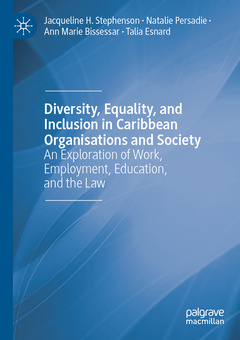Description
Diversity, Equality, and Inclusion in Caribbean Organisations and Society, 1st ed. 2020
An Exploration of Work, Employment, Education, and the Law
Language: English
Subjects for Diversity, Equality, and Inclusion in Caribbean...:
Publication date: 09-2021
256 p. · 14.8x21 cm · Paperback
Publication date: 09-2020
256 p. · 14.8x21 cm · Hardback
Description
/li>Contents
/li>Biography
/li>Comment
/li>
Chapter 1: Introduction (J. Stephenson and A. Bissessar).- Chapter 2: Race Relations in the Caribbean- Re-evaluating Representative Bureaucracy in Trinidad & Tobago and Guyana (A. Bissessar).- Chapter 3: Equality and discrimination on the basis of sex (J. Stephenson).- Chapter 4: Sexual orientation and inclusivity in the region (J. Stephenson).- Chapter 5: Disability :Disparate treatment or inclusion in Caribbean organisations (J. Stephenson).- Chapter 6: Politics and inclusivity in the region (A. Bissessar).- Chapter 7: Efficacy of the region’s equality laws (N. Persadie).- Chapter 8: Equality Laws Compared: The Caribbean, The UK and The USA (N. Persadie).- Chapter 9: Liberalization of Higher Education in the Caribbean: Situating Matters of Access, Diversity, and Equity (T. Esnard).- Chapter 10: Chapter The Challenge of Equity, Diversity and Inclusion within Educational Reform: The Case of Trinidad and Tobago (T. Esnard).- Chapter 11: Conclusion (N. Persadie and T. Esnard).
Jacqueline H. Stephenson is Lecturer in the Department of Management Studies at the University of West Indies, Trinidad and Tobago.
Natalie Persadie is Assistant Professor in the Design and Manufacturing Engineering Unit at the University of Trinidad and Tobago.
Ann Marie Bissessar is Full Professor and former Dean of the Faculty of Social Sciences at the University of the West Indies, Trinidad and Tobago.
Talia Esnard is Lecturer/Sociologist in the Department of Behavioural Sciences at the University of the West Indies, Trinidad and Tobago.




